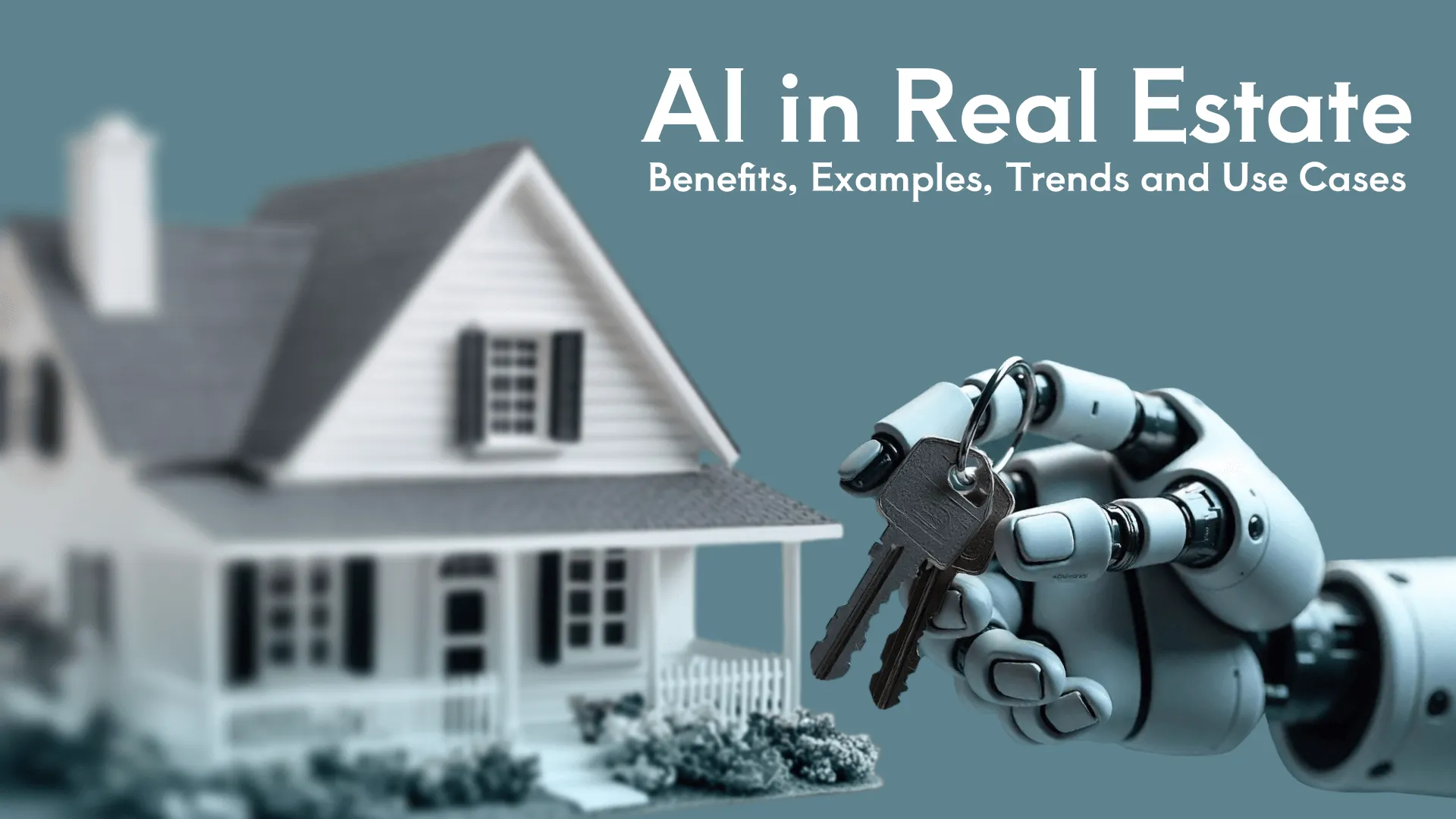Real estate mobile apps and agent websites are becoming more and more popular as a means of searching for the right property, so those who are professionally engaged in this field and planning to expand their business should, in the first place, understand the market and look out for the latest real estate mobile app tech trends. Such awareness will allow you to make informed decisions embarking thus on the journey of lasting business promotion and development.
1. Business intelligence and an increase in data volumes.
The future of real estate mobile application development is hard to imagine without business intelligence. Besides, successful app development should not be separated from data that generally tends to grow at an exponential rate. Keeping these factors in mind, more efficient business processes are becoming an attainable outcome.
Business intelligence derived from big data is already one of the biggest trends in property management. It can empower a real estate application affecting the process of interaction of property owners, agents, and customers in the app. BI provides various tools for the optimization of decision-making.
Business analysis algorithms are applied to get intelligent predictions defining the relationships of app users. Then, it is easier to give an answer to the question about what is going to happen. Reviewing internal data and analyzing business processes, BI is increasing your data-driven real estate business. With business intelligence software solutions, you can optimize your operations leveraging and processing all incoming data.
2. Blockchain.
Real estate is the very industry where blockchain technology can prosper. For a number of reasons, the use of cryptocurrencies in real estate was recognized to be beneficial. Thus, in late 2017, it became possible to buy homes via bitcoins and bitcoin-like currencies. An apartment in Kyiv, Ukraine, was the first property sold using blockchain technology. Following market trends in real estate, a number of blockchain real estate startups have emerged since then. This happened not for nothing — real estate transactions are subject to certain disturbing problems:
1. Possibility of fraud. Risk of fraud is likely to exist as long as real estate property agreements are in paper form for they can be falsified by people then. Blockchain minimizes this risk. The so-called smart contracts can link digital property ownership to the blockchain. Such documents are impossible to alter once they are encrypted, so cryptography keeps them safe and impossible to forge.
2. Everyone is tripped up by red tape. Tedious paperwork is a distractor for buyers and tenants as is for property owners and agents. So, this is one of the best things the blockchain can do for you, namely cut this paperwork turning this process into a fairly straightforward transaction — smart contracts are verified and time-stamped by means of the blockchain, not by notaries.
3. A large number of mediators. Classically, there are numerous intermediaries involved in closing real estate deals: notaries, bankers, real estate brokers, and others. With the blockchain, one can avoid paying extra for at least some services. Thus, for example, repetitive transactions can be made bypassing middlemen.
4. High entrance barriers to real estate investing. Much money is normally required to start investing in real estate. However, now, everybody can buy fractional ownership that may vary in size for cryptocurrency. Syndicating their financial power, a group of shareholders is allowed to share the property.
5. Up-to-date and relevant property information is difficult to obtain. In fact, one has to pay in order to get it. In theory, the blockchain can store all the relevant information on the property and the parties involved. Not only is it stored securely, but the records can also be updated at any time without the approval of the intermediaries. Trust is embedded in the technology for secured records are immutable since they are originally added and accessible in real-time.
3. Virtual and augmented reality.
Another huge real estate technology trend is virtual reality (VR.) With the introduction of VR/AR, the real estate is claimed to enter the third synthesis phase in the evolution of its technology, which enables an increase in the efficiency of physical spaces’ management. Buyers are expected to increasingly use VR technology to view homes benefitting in doing so from spatial visualization without even attending the chosen property. This will save valuable time and money offering instead a higher quality experience to the users.
Engel & Völkers and Sotheby’s are the companies using VR technology to enhance their businesses and the number of those alike keeps growing. Namely, these are the benefits arising from the use of VR/AR in real estate:
- Advanced remote property viewing with virtual tours.
- Increased efficiency of property marketing.
- Accessibility via mobile applications and web apps.
- A possibility for customers to win time and investigate a property in detail.
- A potential to cover multiple stages of sales, buying, and even decorating processes.
4. Artificial intelligence algorithms assistance.
AI is another technological advancement to take advantage of in the real estate arms race. Not only are buyers and tenants becoming more knowledgeable but also the technology itself is helping them. AI algorithms are a tool for matching deals with customers and maximizing the income potential for investors. These are three ways in which AI can improve your business performance:
1. Recommendations. First of all, AI could increase the relevance of recommendations. The real estate websites or mobile applications have to provide more clients with the relevant offers for them to be able to choose a home of their dreams. AI-based algorithms are capable of personalizing customers’ interactions with your website or app.
2. Property management. Defining mobile app trends in the real estate industry, we should not forget about the efficient management of the property. A lot of issues have to be constantly kept track of: property and rental listings, buyer and tenant application, maintenance requests, etc. Naturally, no matter how organized and conscious a manager is, he or she can easily get lost in the abundance of this information. AI algorithms are coming in handy here. They may help in monitoring vital metrics and predicting long-term trends in crime rates, property prices, possible errors, when maintenance will be required and more.
3. Data analysis. Analyzing data assets is more about Machine Learning (ML) than about Artificial Intelligence. In fact, ML as a current application of AI is often associated with Big Data. ML algorithms are learning from the incoming data and helping real estate business owners improve multiple facets thereof so that they could deliver better services and have their pricing transparent and up-to-date.
Homer, a project Vilmate is currently working on, exemplifies this particular Big Data-driven feature. Big data analytics and APIs enable collecting and making use of detailed information about household appliances and real estate items (related warranties, manuals, photos, maps, links and more) automatically from the corresponding websites right after users’ adding them to their personal lists on an application.
5. Digital housing societies and sharing economy.
The recent housing crisis has been driving homeownership down to the lowest level since the 1990s. As a result, a new trend called “sharing economy” has emerged. People are in doubt as to whether they should own or rent the property. Millennials, who are becoming the target audience for a property at the real estate market, tend to believe that space and goods are better when they are shared. So, the Internet-based platforms operating, among other things, in the sector of accommodation and real estate are in high demand for they can do a good job providing people with the searched-for sharing economy benefits.
Yet, sharing a property with a view to cutting down expenses is not the only trend in real estate that is uniting people. Belonging to a housing society proves to be equally important. Boappa is a Swedish company whose focus is generally on making one’s home a better place to live in by means of bringing neighbors together. In particular, this app for creating housing communities fulfills a vital social function. Once a new tenant or resident moves in, he or she can download an application to find friends among their new neighbors and collaborate with them. Besides, it can be used to arrange details of sharing a vacation house with others. It is a well-structured app that is capable of fostering users’ belongingness.
6. Smart homes.
Real estate and the Internet of things form, not surprisingly, a happy combination. Being a system of sensor-equipped devices, it gathers, analyzes, and makes use of the digital data. Accordingly, the effective use of data is now a universally competitive advantage. Not only the real estate industry, including multiple categories of commercial real estate, can benefit from it. The resulting intelligent building market is largely empowered by using IoT in real estate.
IoT is definitely becoming one of the real estate mobile app tech trends now. Since IoT items like automatic light control or smart thermostats are not entirely new anymore, their costs are going down. Buyer demand for smart home controls is thus also expected to grow. One cannot but admit that hundreds of sensors connected to IoT platforms are contributing to the enhanced quality of the tenants and residents’ experiences. IoT is becoming the future of real estate technology. These technologies can be integrated by agents into their marketing plans and taken advantage of by facility managers responsible for the repair and maintenance of the building. Eventually, AI algorithms paired with the solid system of IoT devices can promote high-quality property management, namely a better control of the HVAC, lighting, fire, and security systems of a building.
7. Localization and the power of geolocation.
More agents than ever before are anticipated to go hyperlocal. One of the reasons is that property owners are getting disconnected from real estate agents. As a consequence, more real estate agents are focusing on what can make delivered services more valuable — on local property marketing. Being one of the hottest real estate technology trends, the geolocation can help realtors focus on this market demand. Good knowledge of local markets and assistance in finding one’s bearings there is a service to be sold at a good price. In fact, there are quite a number of things that can go wrong without the real estate agent’s help and a smart specialist has to take care that the information they are providing is exclusive and highly relevant.
Geolocation technology, in turn, helps not only pinpoint the physical location of the chosen property but also visualize such parameters as property data, county maps, topography, flood zone maps, soils in order to assess the land value.
To have the data and above services delivered in the most convenient way for all parties involved, it is a good idea to get a personal real estate management software solution developed and implemented. Then, as long as an agent can provide his or her services taking full advantage of everything that the rise of real estate technology entails, they all and their services remain high-demand.
Conclusion
The future of real estate tech will be driven by the above mobile app trends in the real estate industry. These seven points may seem apparent to property owners, buyers, tenants, and most importantly to real estate agents in 2020. It is, however, worth mentioning that mapping out one’s strategic future is much easier when there are straightforward recommendations to follow. Sure enough, we have touched not all bases but those mentioned are a great point of departure. Keep them in mind and try to ensure as many features and benefits of real estate management software as possible!





7 thoughts on “Top Tech Trends Transforming the Real Estate Kenya Industry”